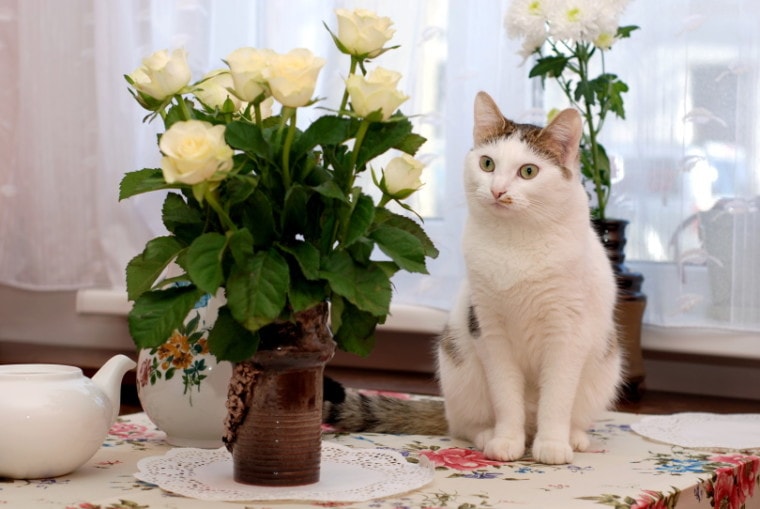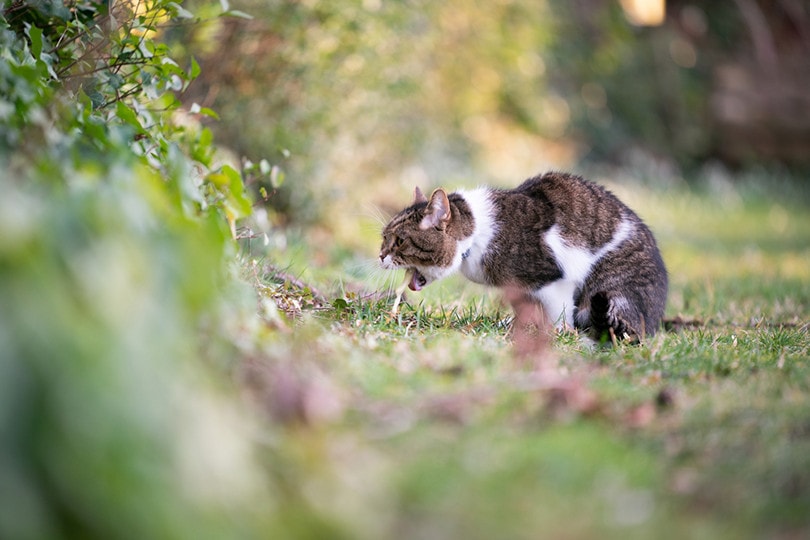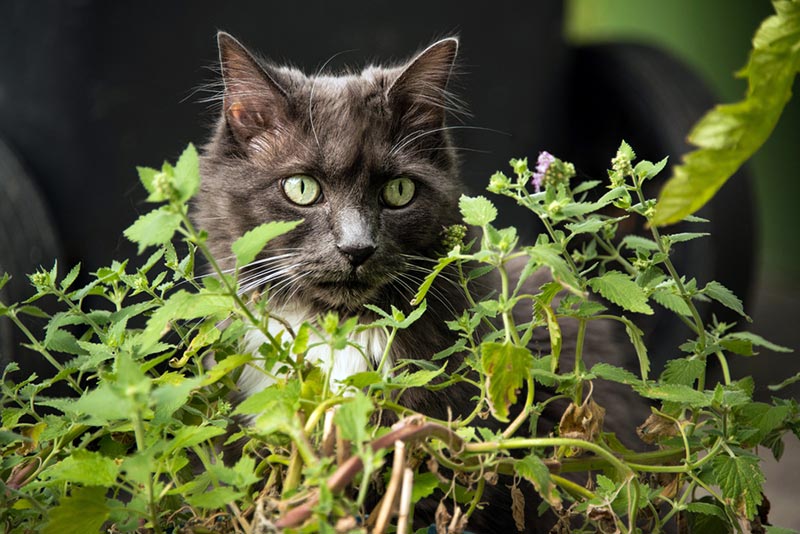
Click to Skip Ahead
If your cat is a plant chewer or you’ve come home to find them eating a bunch of flowers you have in your home, you might wonder what compels them to do so. Flower eating can be a nuisance at best, but it can also require a trip to the emergency vet.
It can be dangerous for your cat to eat flowers and plants since some are incredibly toxic. This article will examine five reasons why your cat might eat flowers, which flowers are unsafe for them, and what you can do about it.
The 5 Reasons Why Cats Eat Flowers
1. To Induce Vomiting
Some cats might eat flowers and other plants to help them alleviate feelings of nausea or to induce vomiting. This study determined that over ⅓ of cats that ate plants vomited afterward, leading us to think that eating the plant had something to do with digestive issues.1
If your cat is frequently chewing on flowers in your garden or home, they could be trying to induce vomiting. If you notice this behavior, or if your cat seems to be vomiting regularly, ensure you take them to the veterinarian to determine the cause!

2. Because It’s an Instinctual Behavior
The modern domestic cat is descended from the African Wildcat (Felis sylvestris lybica), which is a small cat found roaming wild in Africa and Asia. The whole felid family can be observed eating plants, including the African Wildcat.
Many experts on feline behavior believe that our pet cat’s penchant for eating plants stems from their ancestors as an innate, inherited behavior. Even large felids like lions (Panthera leo) eat plants from time to time, so it seems flower chewing is a behavior shared across many species of cats.
3. Boredom
Cats are intelligent creatures that need mental and physical stimulation. The opportunity to exhibit natural behavior through exploration and play is incredibly important for your cat.
If your cat doesn’t get enough stimulation, they can turn to more destructive ways to alleviate boredom, including chewing on your roses! Boredom also leads to anxiety and stress for cats, both of which can also be the cause of your cat’s flower chewing. Chewing is a self-soothing behavior for many cats; if your cat is showing other signs of stress alongside eating your plants, taking them for a check-up at your vet’s office is a good idea.
4. To Gain Nutrition
Cats must eat meat to survive, and their digestive systems are designed to digest animal protein to gain nutrition. However, there are nutrients that plants contain that cats cannot get in high quantities from a meat-only diet.
Nutrients, such as vitamins, are found in plants, which may be why your cat loves to chew on them. Non-digestible fiber is also found in plants and flowers, which your cat can use to assist digestion and move things like hairballs along in their gastrointestinal tract.
5. Because They’re Attractive
Lastly, your cat might be eating your flowers purely because they’re attracted to them. The flowers look appealing and smell nice. Catnip (Nepeta cataria) is an excellent example! The catnip plant has beautiful purple flowers that exude the same scented oil (nepetalactone) that the rest of the plant does.
Nice-smelling flowers will likely attract cats and tempt them to take a bite. However, it is another reason dangerous plants should be removed from your home or garden. Several toxic species have colorful petals and pleasant scents that can entice your cat into eating a potentially fatal dose.

Are Flowers OK for My Cat to Eat?
Your cat will come across flowers from time to time, whether inside your home if you get a bouquet or growing outside. There are so many types of flowers that your cat could come across that it’s difficult to list all the flowers that could cause your cat harm. However, some are incredibly toxic to cats and should never be kept in your yard or home.
Their flowers can have toxic parts, such as the stem or pollen, or the whole plant can be dangerous. While cats are usually fastidious about what they eat, kittens or cats kept inside the home are more likely to indulge in a flower they’re unsure about.
Outdoor cats can be at risk of toxicity from flowers if they accidentally brush past them and pick up pollen on their fur, which they’ll likely groom off.
There are some flowers that cats can eat, and they’re safe for your home. If you’re going to have a display of flowers in a vase or planted in the yard, it’s better to choose a safe flower.
How Do I Stop My Cat From Eating Flowers?
The best way to stop your cat from eating flowers is to remove them from your home and garden or ensure they’re out of reach. Cats are curious and will investigate new, interesting items that come into their home.
If you have a bouquet that keeps getting chewed on, moving the flowers to a room or place your cat can’t access is the best way to keep them safe. Remember that cats are excellent climbers and agile jumpers, so a high shelf may not be much of a deterrent!
Ensuring toxic or harmful plants are removed from your home or garden is essential since some flowers don’t even need to be ingested to be harmful. Tulips, for example, can cause a skin reaction if your cat brushes against them.
Conclusion
Cats eat flowers for various reasons including boredom, digestive issues, and instincts. Whatever the reason, your cat should be discouraged from chewing on flowers unless you can positively identify them as safe. You can also provide your cat with cat grass to chew on if they’re partial to flowers, which provides excellent enrichment!
Featured Image Credit: Nadinelle, Shutterstock







